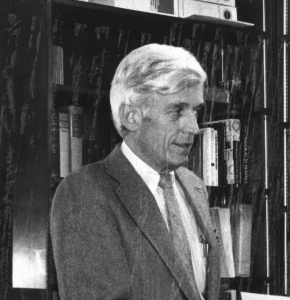(Dec. 1, 1927-Sept. 15, 2008). J. Patrick Rooney was CEO of Golden Rule Insurance Company. He pioneered the use of medical savings accounts and spearheaded the use of school vouchers in Indianapolis. He was born in Lawrenceville, Illinois, where he was educated in the public school system. Here he began his career as a door-to-door insurance salesman for Golden Rule, which his father Michael Andrew Rooney founded on November 16, 1940, operating out of his home at 600 State Street in Lawrenceville.
Rooney became chairman, president, and chief executive of Golden Rule upon his father’s death on June 21, 1976. He moved the company to Indianapolis in the 1980s where he pioneered the use of the Medical Savings Accounts (MSA), the high deductible health insurance type of plan by becoming the first CEO of any company to offer these less expensive alternatives to health care to his employees. Rooney is considered a father of the MSA and the subsequent Health Savings Accounts (HSA) concepts along with John Goodman, Jesse Hixson, and Gerald Musgrave, conceiving the health insurance model in the late 1970s.
His approach to making healthcare more affordable based on tax fairness gained national attention. Initially, with longtime friend (D-IN) and later with Bill Archer (R-TX), Rooney persuaded congressmen to favor his consumer-driven health care initiatives. The collaborative effort resulted in the 1996 enactment of the Health Insurance Portability Act of 1996, allowing the subscriber to earn federal tax credits for its use.
In 1996, Rooney retired from Golden Rule. He sought the Republican nomination for Indiana governor, and when unsuccessful, he acquired and retooled the Medical Savings Insurance Company, an Oklahoma-based insurance company, to sell health insurance tied to HSAs. His work on consumer empowerment continued when he lobbied Congress to win tax-free status for HSAs which Congress granted in 2003.
Rooney also led the fight against intentional discriminatory testing practices against minority applicants in Illinois. In 1976 he engaged in an eight-year lawsuit against the State of Illinois and the Educational Testing Service (ETS). The cost of litigation and expert witnesses approached almost $2 million. The Civil Rights case established a precedent-setting agreement that forced ETS to devise a method of constructing exams designed to eliminate unnecessary racial disparities.
Though embroiled in the Illinois testing discrimination suit during the 1980s Rooney still found time to address the badly broken education system closer to home in Indianapolis. At his church, Holy Angels Catholic Church, Rooney learned about problems facing inner-city children in public schools. To address the problem, he advocated for school vouchers and created a privately funded scholarship program to enable low-income children to attend the school of their choice. In August 1991, five hundred Indianapolis children who qualified for Indiana’s subsidized school lunch program became beneficiaries of Golden Rule’s announcement that they would pay for half the tuition to the selected school.
A. D. Pinckney, president of the Indianapolis pushed back against the use of vouchers. He argued that Golden Rule should funnel money into the struggling public schools instead of subsidizing tuition to send children out of their school district to distant private schools.
However, Rooney found an ally in , a state legislator who represented a 70 percent African American district. Crawford supported Rooney’s plan noting that 54 percent of Indianapolis’ elementary-aged students scored below grade level on national assessment tests. Crawford believed that public schools gave up on kids more easily than private schools and were less effective at disciplining students.
From Rooney’s commitment emerged the founding of the Educational CHOICE Charitable Trust. The trust provides tuition assistance for students from lower-income families in Indianapolis to attend a private school. Rooney’s school voucher plan emphasized children attending low-performing or failing schools who stood to benefit the most from the introduction of choice and competition. He felt that public schools would improve when faced with the possibility of declining enrollment resulting from his program.
In 2020, Rooney’s program operates as with over 2,000 Indianapolis children participating. Nationwide replication of Rooney’s voucher concept funds over 60,000 low-income students in over 80 cities to attend private schools. His plan has met pushback in some states who have blocked the expansion of school choice.
Rooney created the Fairness Foundation to help the uninsured cope with substantial medical bills to deal with another health insurance-related dilemma. Through this organization, he pushed for fair hospital pricing for these self-pay patients. In 2006 Rooney found that hospitals routinely charged 3.5 times Medicare’s pricing of services. The inflated pricing affected racial minorities more than any other group since nationally 35 percent of Hispanics, 22 percent of African Americans, and 11 percent of non-Hispanic Caucasians were uninsured. The Fairness Foundation aimed at educating and defending those most vulnerable to these price-gouging schemes by allying lawyers willing to represent people in disputes over hospital bills.
At the time of Rooney’s death, he was president of Medial Savings Insurance Co. and the Fairness Foundation. He left the bulk of his estate to the M. A. Rooney Foundation which he established in 1969 to direct attention and funds to charitable, educational, and religious programs. These initiatives promoted and provided educational opportunities and interracial justice among other social and community assistance efforts. In 2006, Indiana State University awarded him an honorary Doctorate of Laws in recognition of his lifelong advocacy of civil rights and racial justice.

Help improve this entry
Contribute information, offer corrections, suggest images.
You can also recommend new entries related to this topic.





